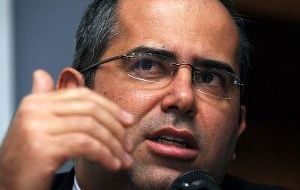MercoPress. South Atlantic News Agency
Brazil loosing industry to Mercosur members with cheaper costs and lower taxes
 Welber Barral a former Brazilian Foreign Trade Secretary, calls for ‘fiscal harmonization’
Welber Barral a former Brazilian Foreign Trade Secretary, calls for ‘fiscal harmonization’ Brazilian business and manufacturing leaders are demanding a “fiscal harmonization” of the Mercosur block since other full members are attracting a growing number of Brazilian companies to those countries lured by cheap energy and qualified labour.
The strong growth of the Brazilian economy, almost to full capacity, and the Super Real have Argentina, Paraguay and Uruguay increasingly attracting Brazilian companies while factories and jobs are lost to Mercosur members, complain industry leaders.
“Business missions sent by the governments of Uruguay, Paraguay and other Latin American countries are frequently visiting Brazil and meeting with associations from the different industrial sectors with the purpose of attracting them to invest in their countries. The bait is not the potential of local markets but more competitive costs than in Brazil”, said Raquel Landim in a piece for O Estado de Sao Paulo.
With the Super Real, manufacturing in Brazil has become very expensive and Mercosur partners offer comparative advantages: Paraguay, cheap energy; Argentina, natural gas at competitive prices and Uruguay qualified labour.
To this must be added the fact that overall taxes are lower in the three countries.
According to O Estado de Sao Paulo, companies that migrate to other Mercosur countries pay lower tariffs for input imports; are exempt from Income tax by operating from special free trade zones and take advantage of the ongoing dispute between Brazilian states over the tax on circulation of goods and services, ICMS, to ship final products to Brazil.
However the Brazilian government is beginning to take action when the ‘maquila’ does not fully comply with the “Made in Mercosur” rules. Some of the fiscal gaps discovered by Brazilian authorities involve: poor origin rules; Mercosur drawback and tariffs.
The Brazilian Textile industry association has discovered that textiles from India, China and Pakistan are introduced to Paraguay and re-exported to Brazil with a minimum input such as stitching seams.
This is particularly true for bed linen which is labelled “Made in Mercosur”.
But for most sectors rules of origin are stricter and determine that a percentage of added-value has to be included. For example in the automotive industry the demand is 60% local content but companies can include such costs as publicity, labour, assembly and maintenance operations, which once subtracted can determine that a Made in Mercosur car effectively ‘has 14% of local auto-parts’.
In the chemical sector companies in Uruguay and Paraguay are importing thermo-plastic resins with tariff zero from Asia and even from Brazil. They transform the original input and sell the end produce to Brazil. This is known as a drawback system which allows for the import free of tariffs and customs duties as long as the final produce is exported, even when it is to a member of Mercosur. In the European Union the system exists and is applied but exports must be out of the region.
Heavy equipment manufacturers in Brazil complain they are loosing infrastructure contracts in the northeast of the country to Argentine companies, because “Argentine have over 600 waivers which enables them to import (i.e. stainless steel) free of tariffs and custom duties. This opens the way for cheaper manufacturing costs.
“If there is Brazilian investment transfer from the industrial park to other Mercosur countries based on comparative advantage, it is not necessarily bad for the Brazilian economy. This means greater regional integration of chain production and more benefits for Brazilian industry. But what is going on is not precisely that, it is quite distant from positive integration”, pointed out Welber Barral a former Brazilian Foreign Trade Secretary in a recent article published in O Estado de Sao Paulo.
“Diplomats to address difficulties of each Mercosur member country have created millions of exceptions and ever more complicated rules which open the way for different-sized gaps. This demands strong political will from all leaders to overcome the situation and agree on fiscal harmony”, concludes Barral.




Top Comments
Disclaimer & comment rules-

-

-

Read all commentsWhen mercerized cotton is also mercosured and maquilaed, then Brasil had better start **'banging its partners' heads together'**.
Aug 29th, 2011 - 01:06 pm 0If Argentina, Paraguay and Uruguay are laundering products made in India, Pakistan & China to get them into Brasil at below market-rate, then Brasil must do what is necessary to remove this stain from the fabric of Mercosur.
And, if 86% of a car comes from outside Mercosur, this is truely NOT a South American product.
And if our Bahian factories, industrial plant, industrial materials are being stocked by Argentinian-sourced (eg) steel through 'smoke and mirrors' subterfuge to avoid taxes, tariffs & duties, then it is Brasil that suffers.
For God's sake, Brasil - **Get Your Act Together and Show Some Balls**.
I agree with you Geoff.
Aug 29th, 2011 - 04:06 pm 0Brazil also needs to stop bitching about the “super real”, fix your out dated tax system that hurts your industry, so that producers can produce more effiecient in Brazil (and keep those import tariffs).
Brasil is a Latin American country !?
Aug 29th, 2011 - 06:32 pm 0Commenting for this story is now closed.
If you have a Facebook account, become a fan and comment on our Facebook Page!